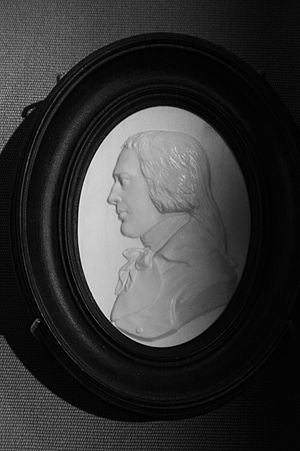Basil William Douglas facts for kids
Basil William Douglas, Lord Daer (1763-1794) was a Scottish nobleman who lived a short but impactful life. He became known for improving farming methods and for supporting changes to how the government worked. He was an active member of groups like the "Friends of the People", which pushed for more fairness in politics. The famous Scottish poet Robert Burns even dedicated some of his poetry to Lord Daer.
Contents
Early Life and Education
Basil William Douglas was born in 1763. He was the second son of Helen Hamilton and Dunbar Douglas, 4th Earl of Selkirk. Even though his older brother died young, Basil did not become an Earl because he passed away before his father.
He studied at the University of Edinburgh. While there, he lived with his teacher, Dugald Stewart. Stewart was an important philosopher during the Scottish Enlightenment, a time when new ideas about society and knowledge were popular. Stewart helped share the ideas of thinkers like Francis Hutcheson and Adam Smith.
In 1785, Lord Daer was chosen as a Fellow of the Royal Society of Edinburgh. This was a big honor, showing he was respected in the world of science and learning. His teachers and friends, including Dugald Stewart, supported his election.
Meeting Robert Burns
In 1786, Lord Daer traveled with Dugald Stewart to Catrine in Ayrshire. There, on October 23, he met the famous poet Robert Burns. This was a special moment, as it was Burns's first time meeting someone from the nobility. Burns later wrote about this meeting, saying:
"Nae honest, worthy man need care,
To meet with noble, youthful Daer
For he but meets a brother"
This poem shows that Burns saw Lord Daer as an equal, despite their different social backgrounds.
Supporting Political Change
Lord Daer shared Robert Burns's belief in democratic ideas, meaning he thought everyone should have a say in government. After visiting France in 1789, where a revolution was starting, he joined several groups that wanted to change the government. These groups aimed for fairer representation in Parliament.
He was a key link between different societies, including the Society for Constitutional Information and the London Corresponding Society. He also worked with the Friends of the People Society in Scotland. These groups brought together people from different backgrounds, all wanting political reform.
Working for Reform
Lord Daer believed that Scottish and English groups should work together for change. He felt this would help Scots have more say in their government. At a meeting of reform societies in Edinburgh in December 1792, he discussed an important message from the Society of United Irishmen. This message, written by William Drennan, was carefully changed to make sure it didn't suggest any disloyalty to the union between Scotland and England. Lord Daer helped make sure the message was acceptable to everyone.
Later Life and Legacy
Sadly, Lord Daer's work for political change was cut short. He died on November 5, 1794, from tuberculosis. He was only 31 years old and had not married. He was buried in Exeter Cathedral. After his death, his younger brother, Thomas Douglas, became Lord Daer and later the 5th Earl of Selkirk.
 | William M. Jackson |
 | Juan E. Gilbert |
 | Neil deGrasse Tyson |


